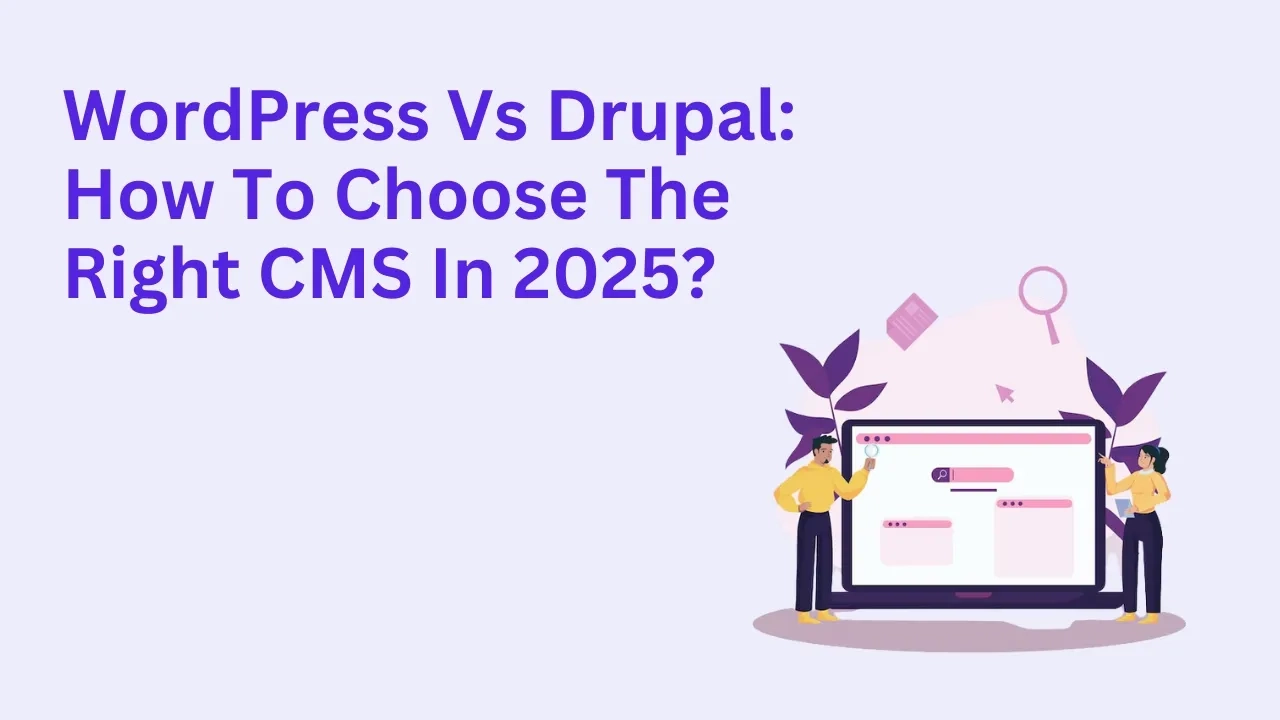WordPress Vs Drupal: How To Choose The Right CMS In 2025?

Choosing the right Content Management System (CMS) is one of the most critical decisions when building or revamping your website. In 2025, WordPress and Drupal remain two of the most popular CMS platforms, each offering unique strengths. This blog will help you understand their differences, features, and how to decide which is the best fit for your needs.
Understanding the Importance of Choosing the Right CMS in 2025
In 2025, a CMS isn’t just about managing content—it’s about enhancing user experience, ensuring security, and scaling with your business. The right CMS can:
- Boost your website’s performance and SEO.
- Simplify content creation and management.
- Provide flexibility for future growth.
WordPress and Drupal are market leaders, but which one aligns with your goals?
Why WordPress and Drupal Dominate the CMS Market
WordPress powers over 43% of the web, making it the most popular CMS. It’s known for its ease of use, extensive plugins, and beginner-friendly interface. Drupal, on the other hand, is favored by developers and enterprises for its scalability, robust security, and customization options. Both platforms have active communities and continuous updates, keeping them relevant.
WordPress Vs Drupal: A Quick Overview of Their Features
- WordPress: Designed for simplicity, WordPress is ideal for blogs, small business sites, and e-commerce platforms. Its plugins and themes enable rapid deployment.
- Drupal: Known for flexibility, Drupal supports complex sites requiring custom workflows, multilingual capabilities, and advanced user permissions.
How WordPress Simplifies Website Creation
WordPress’s intuitive dashboard allows users with minimal technical skills to create and manage websites. Features include:
- Drag-and-drop page builders like Elementor.
- Thousands of pre-designed themes.
- A vast library of plugins for added functionality.
Also read : How to Hire the Best Drupal Development Agency
Why Drupal Is Known for Scalability and Flexibility
Drupal excels in scalability, making it the preferred choice for large enterprises. Key features include:
- Content types and taxonomies for complex data structures.
- APIs for seamless third-party integrations.
- Multisite capabilities for managing multiple websites from one platform.
Learn more about Drupal scalability.
Customization Options in WordPress Vs Drupal
Both platforms offer extensive customization options, but they differ:
- WordPress: Best for plug-and-play solutions with minimal coding.
- Drupal: Requires developer expertise but offers unparalleled flexibility.
WordPress Vs Drupal: Content Management Capabilities
- WordPress: Simplifies content editing with its Gutenberg editor.
- Drupal: Provides advanced content workflows, ideal for teams managing large volumes of content.
SEO Features: Comparing WordPress and Drupal in 2025
- WordPress: SEO plugins like Yoast make optimization straightforward.
- Drupal: Built-in SEO capabilities, such as clean URLs and advanced meta tag management, provide a strong foundation.
WordPress Vs Drupal: Performance and Speed Analysis
Drupal’s lightweight architecture often results in faster load times for large websites, while WordPress relies on caching plugins to maintain speed.
How Secure Is WordPress Compared to Drupal?
- WordPress: Security depends heavily on plugins and regular updates.
- Drupal: Known for its enterprise-grade security and strict coding standards.
Also read : Why Drupal Is the Best CMS to Build an Educational Website
Ease of Use: WordPress Vs Drupal for Beginners
WordPress is user-friendly and perfect for beginners. Drupal has a steeper learning curve but offers extensive documentation and community support.
WordPress Vs Drupal: Best CMS for Small Businesses
Small businesses with limited budgets often prefer WordPress due to its affordability and ease of use. Drupal is better suited for growing businesses with complex requirements.
Why Large Enterprises Prefer Drupal Over WordPress
Large enterprises choose Drupal for its:
- Robust security.
- Customization options.
- Ability to handle high traffic and complex workflows.
API and Third-Party Integration: WordPress Vs Drupal
Both platforms support API integration, but Drupal’s structured approach makes it a winner for complex integrations like CRMs and ERPs.
Multilingual Capabilities: WordPress Vs Drupal
- WordPress: Offers plugins for multilingual sites.
- Drupal: Provides native multilingual support with advanced features.
Also read: Drupal 11 Features You Should Know About
Comparing the Support Ecosystems of WordPress and Drupal
- WordPress: A vast community and thousands of tutorials.
- Drupal: Dedicated forums and professional developer support.
Key Questions to Ask Before Choosing WordPress or Drupal
- What are your website’s goals?
- Do you need advanced customization?
- What is your budget for development and maintenance?
WordPress Vs Drupal: How to Make the Final Call
Choosing between WordPress and Drupal depends on:
- Your business size and goals.
- The complexity of your website.
- Your budget and technical expertise.
Conclusion
In 2025, both WordPress and Drupal offer robust solutions for different needs. WordPress is ideal for beginners and small businesses, while Drupal is the go-to choice for large enterprises and complex projects. Evaluate your requirements carefully to make the right decision.
If you’re unsure which CMS suits your business, get in touch with Drupalify for expert guidance and support!








